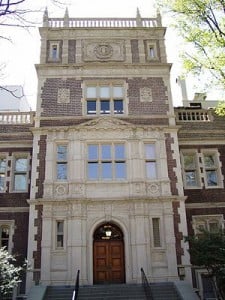An anonymous gift of $16 million in science research funding to the Raymond and Ruth Perelman School of Medicine at the University of Pennsylvania will fund the establishment of the Neuroscience of Behavior Initiative, which aims to strengthen Penn’s program in basic, translational, clinical and population research into the areas of addiction, depressive disorders and neurodegenerative disease. The gift is the single-largest donation for neuroscience research in the school’s history.
The donation is the first phase of what’s expected to be a long-term endowment by the donors to the Neuroscience of Behavior Initiative, to be led by Brian Strom, MD, MPH. Dr. Strom is chair and professor of Biostatistics and Epidemiology, director of the Center for Clinical Epidemiology and Biostatistics at the University of Pennsylvania, and vice dean for Institutional Affairs. He is also a world-eminent epidemiologist and an expert in preventative medicine and public health.

(Photo of Dr. Strom courtesy of makinghistory.upenn.edu)
The Neuroscience of Behavior Initiative will use the science research funding to continue making pioneering advances in mental and neurological research and care at Penn Medicine. The interdisciplinary nature of the effort is anticipated to develop new science and better existing science.
Established in 1765 as part of the nation’s first school of medicine, Penn Medicine has always been innovative in areas like patient care for mental and neurologic health. Benjamin Rush was one of the original teachers in the nation’s earliest medical school and the first chair of chemistry in America. An international leading expert on mental diseases in the late 1700s and early 1800s, Rush’s clinical work and scholarship secured him the reputation as the father of American psychiatry.
Penn Medicine remains known today as a revolutionary program in the field of psychiatry and neuroscience because of the advances the program’s researchers make in research, clinical care, education and publication. Researchers at Penn have been active in the improvement of many treatments, including Cognitive Behavior Therapy, Prolonged Exposure Therapy for post-traumatic stress disorder (PTSD), naltrexone for addiction, transcranial magnetic stimulation (TMS) for depression, and the first new medication for depression in 10 years.

(Photo of Penn Medicine courtesy of MedCity News)
Penn Medicine researchers have also redefined the field’s thinking on neurodegenerative diseases. The breakthrough discoveries of key proteins in the pathology of neurodegenerative diseases and leading advances for earlier disease diagnoses in Alzheimer’s and Parkinson’s disease are both the work of Penn researchers. Penn Medicine is also a directing force in the genetic and drug discovery work being done to battle Alzheimer’s disease. The $16 million science research funding gift will allow Penn to continue making revolutionary advances in the field.
If you are a science researcher or lab supplier interested in meeting people in your field, consider attending the 13th Annual Philadelphia BioResearch Product Faire event at the University of Pennsylvania on May 16, 2012. Biotechnology Calendar, Inc. is a full-service science research marketing and event-planning company. Our catered vendor shows are a great way to network and meet others in the science research and laboratory supply industries. If you are a lab supplier and would like to educate UPENN researchers and increase your company's scientific sales, plase click the button below. To learn more about Biotechnology Calendar, Inc. events, check out our 2012 calendar.


